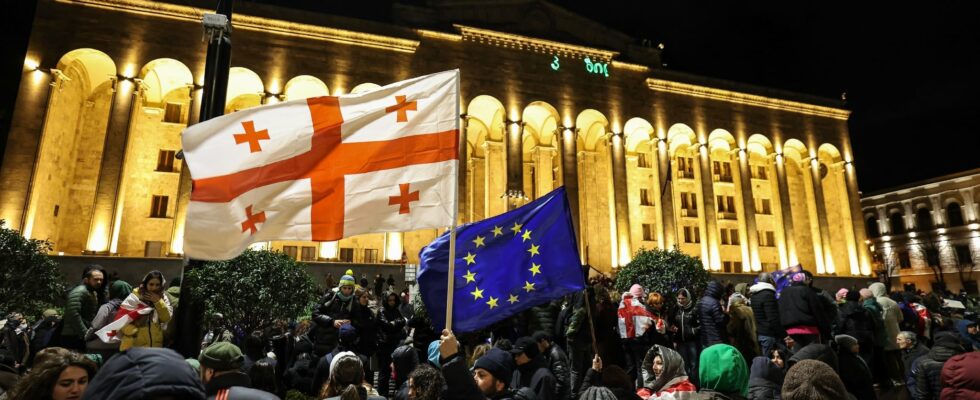At the back of the procession, on Avenue Roustavéli, David hands out khachapouri, these traditional Georgian breads with butter and cheese, to the protesters. “It’s important that people stay here as long as possible,” insists the young man. Since November 28, tens of thousands of Georgians have occupied the streets of the capital, Tbilisi, every night to protest against the government’s decision to suspend the country’s accession process to the European Union “until 2028”.
A postponement that the population of this Caucasian country, 80% pro-European, received like a stab – Georgia has officially been a candidate for EU membership since December 2023. Rarely, the protest has spread to other cities in the country. In the processions, slogans insult those responsible for the Georgian Dream, the ruling party, whose decisions actually come from a shadowy man: Bidzina Ivanishvili, the oligarch founder of the party, reputed to be close to Moscow.
Wrapped in Georgian and European flags, the demonstrators are equipped with construction helmets and gas masks to protect themselves from the tear gas grenades and water cannons used by the police forces stationed in front of the Parliament. “We want to move our country towards Europe, but the government is throwing gas in our eyes and beating journalists and politicians,” protests Katerina Sondavidze, a medical student. Police repression has escalated in recent days, injuring several dozen demonstrators.
The student is also calling for new legislative elections – the vote of October 26, which consecrated the Georgian Dream for a fourth term, having been marred by irregularities bearing the signature of the Russian services, recently confided the President of Georgia, Salomé Zourabichvili, at L’Express.
“The government wants to distance us from Europe”
To quell the anger in the streets, the executive ensured that integration into the EU remained its priority. But Zourab, a 37-year-old lawyer, is not fooled. “The government wants to distance us from Europe and NATO, and it gives Russia the unprecedented possibility of extending its influence over Georgia,” he said.
“Georgian Dream makes it clear that it wants to get closer to authoritarian regimes like Russia and China, underlines Kornely Kakachia, director of the think tank Georgian Institute of Politics, in Tbilisi. This is a decisive turning point for our country which, in a context of war in Ukraine, is currently in a gray zone between Europe and Russia.” Passed in the spring, the law on “foreign agents”, then that against LGBT propaganda in the fall, had already announced Georgia’s anti-Western turnaround. For Ghia Nodia, political analyst at Ilia State University, the recent decision to postpone EU accession is “a way of provoking radical reactions from the opposition, to then accuse them of an attempt to coup d’état and get rid of it.”
The deep crisis experienced by this former Soviet republic of 3.8 million inhabitants is reminiscent of Ukraine in 2014, when pro-EU demonstrations ended up forcing leader Viktor Yanukovych to leave power – leading to the start of the invasion of Donbass by Russian-controlled separatist forces. “The difference here is that the Georgian government does not officially pose as an ally of Russia, because it would be too unpopular,” continues this political scientist. The Russian neighbor has in fact been feared and hated by the country since the 2008 war won by the Kremlin forces, who still occupy 20% of the territory and are stationed in South Ossetia, 40 kilometers from Tbilisi.
“A Venezuelan scenario”
For the moment, a new Russian intervention remains unlikely, as it would undermine the credibility of the ruling party. “Moscow seems to prefer a hybrid offensive,” assures the Georgian president. The big winner from Tbilisi’s distancing itself from Europe, Moscow accuses the West of preparing a “color revolution” in this country. For its part, Georgian Dream brandishes the threat of a new Russian invasion if the pro-Western opposition takes power – while reiterating its promises on future membership in the EU.
But this double discourse knows its limits. Georgian diplomats have resigned because of this geopolitical shift. And the country’s main banks and companies have denounced the distance from Europe and the violence committed against demonstrators. Although the protest movement is starting to run out of steam, it could shake the country again after the presidential election on December 14 – only deputies and local councilors vote. However, this electoral college is largely won over to power. He should therefore choose the candidate of the Georgian Dream, the former football player Mikhail Kavelashvili, with anti-Western rhetoric, who last year drafted the controversial law on foreign agents.
Outgoing President Salomé Zourabichvili has already announced that she will not leave her post “as long as there is no legitimate Parliament”. “A Venezuelan-style scenario, with two presidents, would be terrible for Georgia,” judges Kornely Kakachia. But the current government, which accuses the demonstrators of being financed by “foreigners”, has already refused any compromise. Enough to strengthen the motivation of the most rebellious. For Irakli Abuladze, a fifty-year-old from Tbilisi who goes to protest every evening, “people will continue to come as long as they are not free”. 300 protesters are already behind bars.
.
